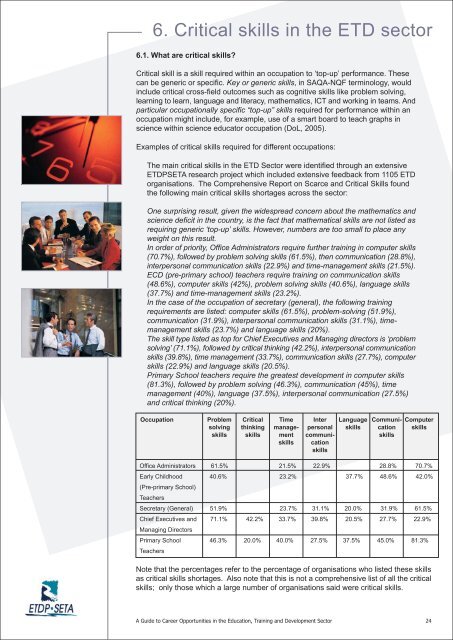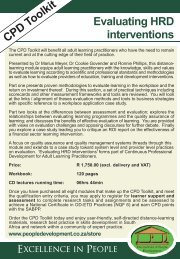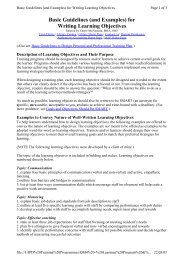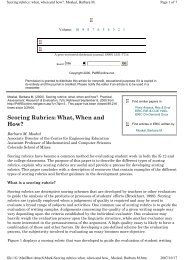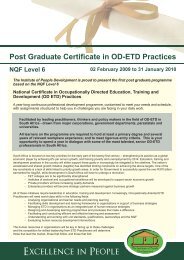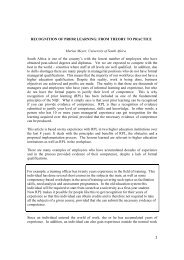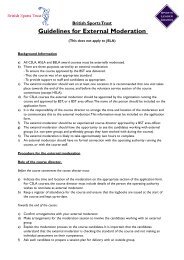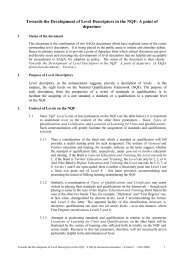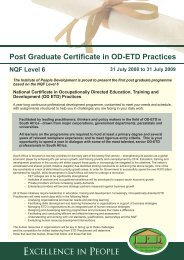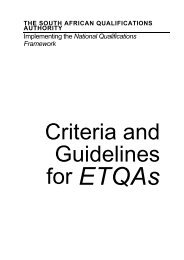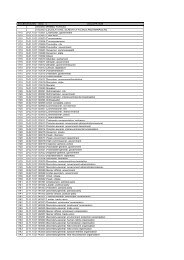ETDP SETA CAREER GUIDE - The Institute of People Development
ETDP SETA CAREER GUIDE - The Institute of People Development
ETDP SETA CAREER GUIDE - The Institute of People Development
You also want an ePaper? Increase the reach of your titles
YUMPU automatically turns print PDFs into web optimized ePapers that Google loves.
6. Critical skills in the ETD sector<br />
6.1. What are critical skills?<br />
Critical skill is a skill required within an occupation to ‘top-up’ performance. <strong>The</strong>se<br />
can be generic or specific. Key or generic skills, in SAQA-NQF terminology, would<br />
include critical cross-field outcomes such as cognitive skills like problem solving,<br />
learning to learn, language and literacy, mathematics, ICT and working in teams. And<br />
particular occupationally specific “top-up” skills required for performance within an<br />
occupation might include, for example, use <strong>of</strong> a smart board to teach graphs in<br />
science within science educator occupation (DoL, 2005).<br />
Examples <strong>of</strong> critical skills required for different occupations:<br />
<strong>The</strong> main critical skills in the ETD Sector were identified through an extensive<br />
<strong>ETDP</strong><strong>SETA</strong> research project which included extensive feedback from 1105 ETD<br />
organisations. <strong>The</strong> Comprehensive Report on Scarce and Critical Skills found<br />
the following main critical skills shortages across the sector:<br />
One surprising result, given the widespread concern about the mathematics and<br />
science deficit in the country, is the fact that mathematical skills are not listed as<br />
requiring generic ‘top-up’ skills. However, numbers are too small to place any<br />
weight on this result.<br />
In order <strong>of</strong> priority, Office Administrators require further training in computer skills<br />
(70.7%), followed by problem solving skills (61.5%), then communication (28.8%),<br />
interpersonal communication skills (22.9%) and time-management skills (21.5%).<br />
ECD (pre-primary school) teachers require training on communication skills<br />
(48.6%), computer skills (42%), problem solving skills (40.6%), language skills<br />
(37.7%) and time-management skills (23.2%).<br />
In the case <strong>of</strong> the occupation <strong>of</strong> secretary (general), the following training<br />
requirements are listed: computer skills (61.5%), problem-solving (51.9%),<br />
communication (31.9%), interpersonal communication skills (31.1%), timemanagement<br />
skills (23.7%) and language skills (20%).<br />
<strong>The</strong> skill type listed as top for Chief Executives and Managing directors is ‘problem<br />
solving’ (71.1%), followed by critical thinking (42.2%), interpersonal communication<br />
skills (39.8%), time management (33.7%), communication skills (27.7%), computer<br />
skills (22.9%) and language skills (20.5%).<br />
Primary School teachers require the greatest development in computer skills<br />
(81.3%), followed by problem solving (46.3%), communication (45%), time<br />
management (40%), language (37.5%), interpersonal communication (27.5%)<br />
and critical thinking (20%).<br />
Occupation<br />
Problem<br />
solving<br />
skills<br />
Critical<br />
thinking<br />
skills<br />
Time<br />
management<br />
skills<br />
Inter<br />
personal<br />
communication<br />
skills<br />
Language<br />
skills<br />
Communication<br />
skills<br />
Computer<br />
skills<br />
Office Administrators 61.5% 21.5% 22.9% 28.8% 70.7%<br />
Early Childhood 40.6% 23.2% 37.7% 48.6% 42.0%<br />
(Pre-primary School)<br />
Teachers<br />
Secretary (General) 51.9% 23.7% 31.1% 20.0% 31.9% 61.5%<br />
Chief Executives and 71.1% 42.2% 33.7% 39.8% 20.5% 27.7% 22.9%<br />
Managing Directors<br />
Primary School 46.3% 20.0% 40.0% 27.5% 37.5% 45.0% 81.3%<br />
Teachers<br />
Note that the percentages refer to the percentage <strong>of</strong> organisations who listed these skills<br />
as critical skills shortages. Also note that this is not a comprehensive list <strong>of</strong> all the critical<br />
skills; only those which a large number <strong>of</strong> organisations said were critical skills.<br />
A Guide to Career Opportunities in the Education, Training and <strong>Development</strong> Sector 24


